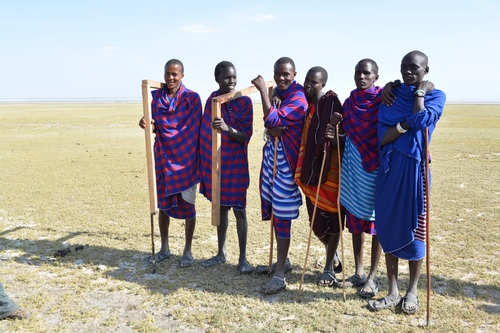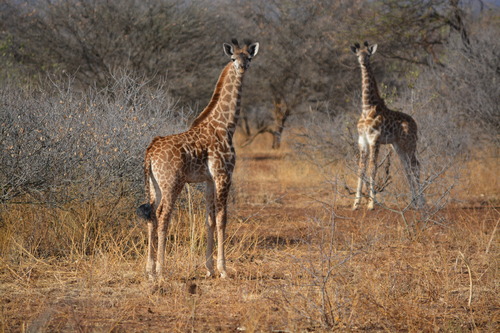This week, Tanzania got really REAL. Like I mentioned in my last post, we went to Lake Manyara National Park on Monday and Tuesday. On Wednesday, we had a field lecture a few kilometers from our camp. We drove to Elephant Hill, where elephants are actually no longer found. Our lecture was based around human-wildlife conflict and the influence that the locals have on the land. We learned that elephants don’t use this land anymore, because there is no forest corridor to allow them to reach this area. When one stands at an overlook of the valley in this area, it is very clear that humans prevail. Although still beautiful, the areas are no longer natural forests. Most of what is seen is open landscape or agriculture. Some of the Ngorongoro Crater forest can be seen from the soccer field by our camp, and if we drive 6-8 km down the road, we can overlook the Lake Manyara National Park forest. This is great, but like we’ve learned, the locals graze their cattle, sheep, and goats just about everywhere here, even in illegal areas, like national parks and conservancies. Most areas are overgrazed and the vegetation cannot grow back fast enough to support wildlife and livestock. Here, the government owns the wildlife, and the locals do not like that. Often animals such as lions, elephants and rhinos are poached in East Africa, but these aren’t the only animals poached here. Sometimes wildlife is poached, because locals are trying to retaliate against the government for land or hunting restrictions, or because locals retaliate against wildlife that kill their livestock. Sometimes, wildlife is poached, because people want valuable things that animals have, like the ivory tusks on an elephant. Often, poaching is used as a way to access bush meat, which is sold for money or eaten.
On last Wednesday, we were informed that we would be having a traditional Tanzanian goat roast on Friday to officially welcome us to the community. Kiri, our Student Affairs Manager (SAM) informed us that the entire process of the goat roast would be done at our camp. Our SAMs encouraged us to watch the whole process, because it is important in the Tanzanian culture and that as meat eaters, we should see and understand the process. I didn’t really think a whole lot about it until Friday, when I had decided to watch the process. Although, not something that I was particularly crazy about, because I love the cute little fluffy goats that we see running around, I also knew that it was a way of life for all, here (and everywhere). Honestly, it was quite a real experience for me, even though I have been exposed to things like it before. On Wednesday, a few of us visited a school program known as Project Rhotia. Students dedicated to learning come here after (actual) school to learn english and computer skills (surfing the internet, Microsoft Excel, Word, etc.). The kids were great! We only went there to meet them, but then we ended up teaching them songs like ‘head, shoulders, knees, and toes’ or ‘the itsy bitsy spider.’ They taught us an even better song in english about mountains and they even had a dance for it, They are great kids, and I’ve decided to dedicate some time to helping them learn english and computer skills. In turn, they are going to help me with Swahili!

Thursday, we went into the field to conduct a scat survey. We went to plains next to Lake Manyara and conducted scat transects with the help of Maasai men. There are many Maasai tribes in this area. Although, Tanzania is a Swahili speaking country, Maasai have their own language but normally know Swahili as well. The words we had to know to communicate with the Maasai men were engine (goat), engerry (sheep), engiteng (cow), osikiria (donkey), orngojine (hyena), oloitoko (zebra), engoli (Thompson’s gazelle). enguili (impala), and orkimosorok (wildebeest). The man on the left was helping us identify the scat for our survey. We had a great time! At the end of our transect, we walked to Lake Manyara and viewed thousands and thousands of flamingos. First wild flamingos I have ever seen (and in thousands)! Thursday was a great day, until I figured out that someone had stole my bank card number, and the only way for me to cancel the card was to call. Thankfully, my sister cancelled it for me, and I have to buy minutes to put on someone’s tracphone to call the states and try to get my money back. It was very annoying, but at least it was taken care of on Friday.
We celebrated a student’s birthday on Friday. They have awesome birthday evenings here. After dinner, the cook staff and a few others will come together. The lights in the dining hall are shut off, and they come in singing/chanting an awesome song in Swahili carrying small branches from trees that they wave around while dancing. The way they sing and harmonize is absolutely amazing. As they dance around the dinning hall, they gather students into the dancing circle and we join in. It is so much fun, plus, there’s CAKE!
On Saturday, for our Environmental Policy class, we were put in groups of four and dropped off in a village to survey local people. At first, we were a little worried, but they had a translator for us and he walked around with us, and confronted all of the residents for us. We ended up having a ton of fun! The people here are so nice! They are nothing like American people. All of them answered our questions. Everyone we asked questions too were apart of either the IRAQW or Maasai tribes, we believed. The first family we visited were very nice. They invited us into their home and offered to let us try their local alcohol that they make from maize. We declined, of course. Before we left, a mother tried to give us her youngest son, probably 3 years old. We laughed and she laughed with us, but she was serious. Our translator told us that she most likely tried to give him to us because she could not afford to send him to school when it was time, and she has other kids to support. We were also told that some people in the village believed that we were there to take the land. Most people were very nice and cooperative. Most of the time, everyone in the area was staring at us, and they don’t always look like the friendliest people, but often, they are cooperative and helpful.

Sunday was our free day! Most people went and explored Mto wa Mbu and either did a morning hike, knife painting class or bike ride. I got lucky enough that I got to tag along with a professor and a student who is conducting camera trap studies. I went along to help take notes and set up the cameras. We went to Manyara Ranch, picked up a ranger, who had a gun with him, and went on our way into the bush. We saw a ton of wildlife! Things we saw were: dik-dik, kudu, impala, giraffes, elephants, banded mongoose, wildebeest, an owl, eland, a secretary bird, a spotted hyena, weavers, a deceased leopard turtle’s shell and a ground nesting bird’s nest. I had a great time! We also saw the skeleton of a poached elephant from 2011. Sidenote–after 2011, more rangers were implemented into the area and elephants haven’t been poached there since then.. hopefully it stays that way!
Monday, we started our second and a half week of classes. We had a paper due Wednesday on baboon behavior, so I spent the next few evenings trying to finish it up. Tuesday, we got to do a birding exercise! My favorite exercise, yet! Added some new birds to my life list too. 🙂
Location: Rhotia, TZ
Loading map...





